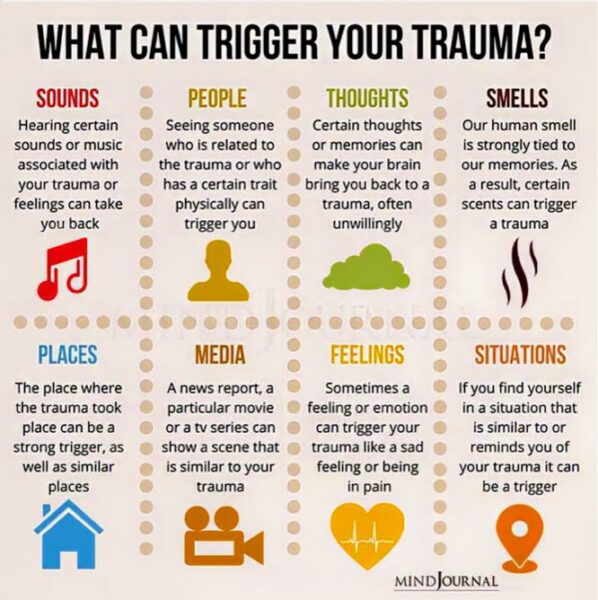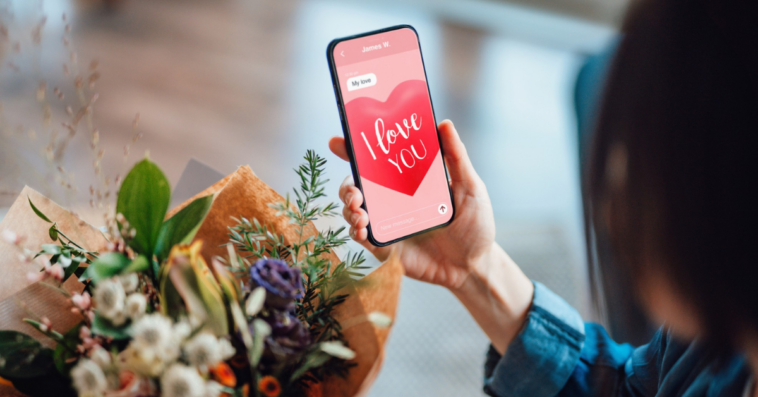Trauma triggers are specific stimuli that evoke intense emotional and physiological reactions in people who experienced traumatic events in the past.
Triggers vary widely from person to person as they’re tied to each person’s individual experiences.
They can be external, like sensory cues; internal, like intrusive thoughts; and situational, like events similar to the person’s past trauma.
People experiencing post-traumatic stress disorder (PTSD) are advised to identify and avoid their triggers whenever possible.

The symptoms of PTSD were identified in soldiers and survivors of natural disasters in writings by ancient Greeks, Romans, and Indians, but the terminology dates to just the 1980s.
It was previously referred to as “shell shock” in WWI, “battle/combat fatigue” in WWII, and “gross stress reaction” in the Diagnostic and Statistical Manual of Mental Disorders (DSM) during the 1950s.
A woman triggered by her childhood memories of her father’s cruelty turned to the “Am I The A**hole” (AITA) subReddit for feedback on a hypothetical “Would I Be The A**hole” (WIBTA) solution to avoiding one of her trauma triggers.
Next-Watercress1957 asked:
“WIBTA if I told my boyfriend saying ‘I love you’ makes me uncomfortable?”
The original poster (OP) explained:
“I (22, female) am uncomfortable saying ‘I love you’ because my dad used to abuse my mom, then sit me down and ask, ‘You don’t think I’m a bad dad, right?’ and make me say, ‘I love you too,’ before I could go back to watching Spongebob or something.”
“I do not say ‘I love you’ to anyone else, including friends and family. I prefer to express it through actions.”
“This is my first serious relationship with my boyfriend (25, male), and his second relationship. We’ve been together for 2 years.”
“He said ‘I love you’ 16 days into dating and a month into us knowing each other. I was very surprised, because I thought people dated for like 6 months before saying that.”
“I asked him why, and he said he just knew how he felt and wanted to say it. I thought he was kind of crazy, but he did not pressure me to say it back, which was the most important thing.”
“Three months later, I said it because I meant it. I do love him. We talk every day, and now he initiates it at the end of every phone call.”
“I know this makes him happy, so I thought I would just get over it, but it still bothers me a lot.”
“It has begun to feel routine, and I don’t want to feel like that anymore, but there really seems to be no good way to talk to him about this without hurting him.”
“WIBTA?”
The OP later added:
“By routine, I meant compulsory. I don’t mind hearing ‘I love you’ and I mean it when I say it. I just find it hard to say out loud.”
The OP summed up their situation.
“I don’t want to say ‘I love you’ as often anymore because it makes me uncomfortable. I think that would break anyone’s heart, really.”
Redditors weighed in by declaring:
- NTA – Not The A**hole
- YTA – You’re The A**hole
- NAH – No A**holes Here
- ESH – Everyone Sucks Here
Redditors decided there were no a**holes here (NAH).
“NAH. Honestly, I don’t think this is something you’ll solve just by talking to your boyfriend. You would probably benefit from seeing a therapist who can help work through your past and how it continues to affect you.” ~ Fun_Effective6846
“Yup. Someone tells you they love you, and you feel uncomfortable because it brings back images of your abusive dad? That’s, like, the stereotype for what therapy is for.”
“OP, work through this with a therapist but also talk to your boyfriend. Let him know what’s going on, and see if you can come up with tools to help you manage your issues (and, hey, a good therapist is great at that!).”
“You won’t hurt his feelings by opening up to him, but you absolutely will hurt them if you stop telling him you love him without explaining why.” ~ PerturbedHamster
“Everything you’ve shared here seems completely reasonable and easy to understand. So why not share this same information with your boyfriend.”
“Then find another way to say how you feel that won’t trigger unpleasant memories. Different words that only the two of you understand or a gesture in place of the words.”
“NAH, OP, but like others have suggested, therapy is a good idea. Many workplaces in the United States have an EAP program that offers 3-6 free therapy sessions for employees.” ~ MohawMais
“I could not agree with this more. Your boyfriend will really appreciate this and will hopefully build you a stronger bond knowing you trust him enough to understand where you’re at.” ~ ChildishBumbino
“Def should look into therapy, but simply coming up with a phrase that means ‘I love you’ without using precisely those words will work immediately.”
“She’s not upset with the sentiment. Just triggered by the words.” ~ markgo2k
“Maybe you could find different words that mean that in your relationship, just for the two of you? It’s important to hear that you’re loved in a relationship, but if those words in that order are a traumatic thing for you, as long as the two of you know what you mean then you can use anything.”
“You could say it in a different order, in a different language, or even just say pink elephants or something silly.”
“I do think therapy about this is a good idea as you clearly have some lingering (and understandable) issues and I’m sure that it will help your boyfriend if he’s hurt about this that you’re getting help, whether you choose to ever use those words in that order again or not.”
“You’ll never know unless you talk to him though.” ~ Wise_Date_5357
“My partner was uncomfortable with those words for the first eleven months or so, but would express it in different ways: I care so much about you, I appreciate you, I cherish you.”
“He told me very clearly that he felt it, and just felt some awkwardness with saying the sentence. Now, he’s fine with it.”
“I love the idea of choosing some other words as a kind of secret code, too!” ~ MinervaKaliamne
“A million times THIS! Words are funny that way, that the words alone can be the problem, not necessarily the feeling behind them.”
“My boyfriend doesn’t have an issue with ‘I love you’ (either giving or receiving), but he has an issue if I respond with ‘I love you more’ (something I grew up saying all the time in my family) because that was what his psycho ex-wife used to say, so I’ve found other words or phrases to use instead.”
“I definitely would recommend therapy to work through your past traumas for yourself and your own mental health, but I also highly recommend talking to your boyfriend about it…just explain the situation so he understands where the conversation is coming from, and see if you can settle on a new word or phrase to use in its place.”
“That way, you can still express the feeling to each other in your own special ‘secret language’ but without being triggered or uncomfortable by the specific words. Wishing you the best!” ~ clumsy_tacos
“I like to mix it up a lot, I’m a very lovey-dovey sort and will tell my wife how I feel about her with very little provocation.”
“So to avoid over-using ‘I love you’ into meaninglessness, I try to be more specific, telling her what I specifically appreciate about her, or how she makes me feel.”
“There are so many ways to say you love someone; if a specific phrasing makes you uncomfortable, then I’d lean on another one.” ~ Ruadhan2300
“I don’t think you’d be an a**hole (NAH) for communicating your feelings as long as you’re not making it a him problem. He’s not doing anything wrong. Neither are you, it’s just up to you to find a solution.”
“I think therapy would benefit you. There’s emotional baggage from your childhood that you need to work through. It’s not your fault.”
“But it is your responsibility to grow and heal if you don’t want to be stuck with this baggage forever.” ~ elriochiquito
“NAH, my girlfriend is the same. They just don’t like saying I love you. But I have to tell you, it will hurt your boyfriend.”
“He won’t forget it, no matter what details you share to explain the uncomfortableness, he will wonder if it is something he’s done. It’s been 3 months since my girlfriend told me they dislike saying I love you to me and it still hurts when I think about it.”
“Just be kind, I’m sorry that happened to you.” ~ erwinswifey
“NAH. Your feelings are completely valid, and your discomfort with saying ‘I love you’ stems from past trauma—you’re not wrong for feeling the way you do. And honestly, saying ILY after 16 days is wild to me, too!”
“Don’t force yourself into something that makes you uncomfortable, but since he finds joy in saying it, an open conversation might help. Let him know that verbalizing love brings up complicated emotions for you and that you prefer to express it through actions.”
“Make it clear this isn’t about him, but about your personal history. And maybe you could find an alternative phrase you’d feel more comfortable saying if you want to.”
“And I hope I’m not overstepping here, but it might help to also work through your trauma with a professional. Not saying that’s the only solution or that it’ll change how you feel about saying ‘I love you’, but it could help you feel better about it overall.”
“I also struggle with saying ILY, so I get how it can make you feel guilty when you don’t say it as often as someone more vocal.” ~ Els-09
The OP got some sound advice.
Hopefully they’re able to find peace.
